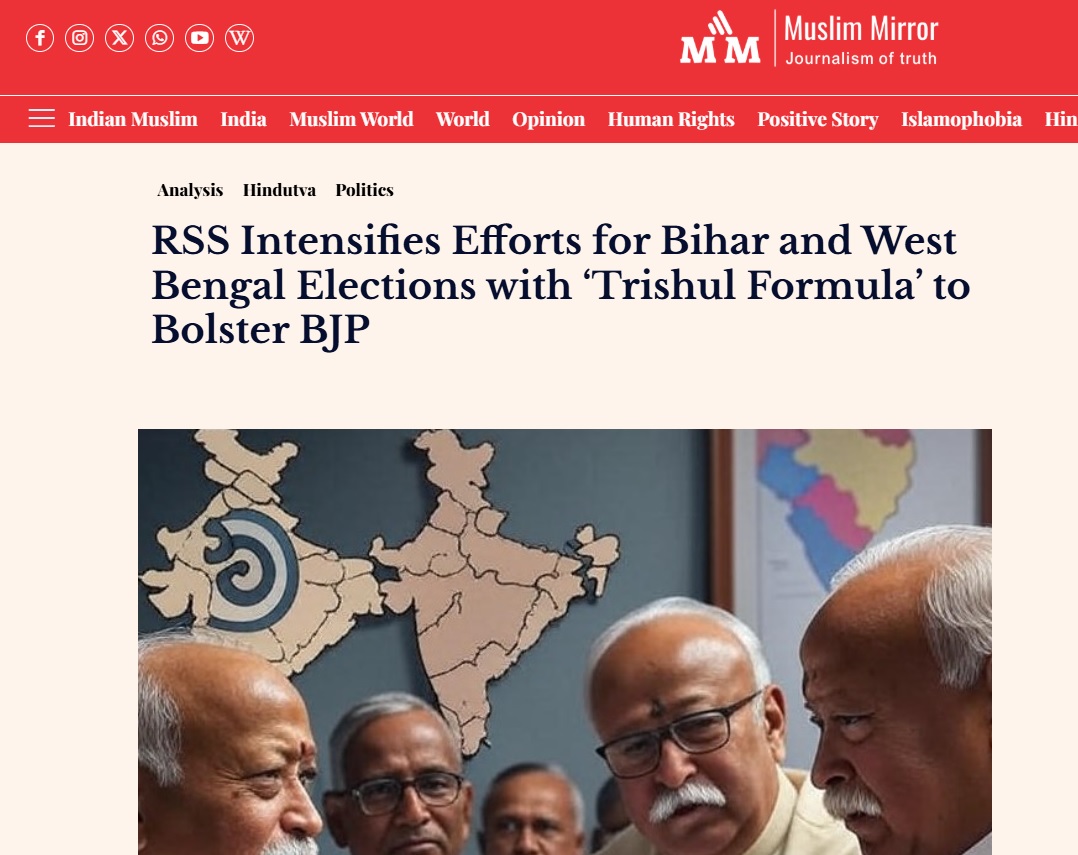Monitoring Desk: Hatemongering has been an ingredient part of the BJP’s political landscape, and with its centenary celebrations approaching in October 2025, the BJP and along with RSS, has introduced ‘Trishul Formula,’ a three-pronged plan designed for political win, and this formula is based on social polarization. The formula comprises three key elements, including “Provoking Communal Sentiments”.
In an article titled “RSS Intensifies Efforts for Bihar and West Bengal Elections with ‘Trishul Formula’ to Bolster BJP” written by Syed Zubair Ahmad and published in Muslim Mirror, the RSS is working to unite upper-caste communities, landlords, and feudal elements under a Hindu nationalist framework. Chief Minister Mamata Banerjee believes RSS is polarizing voters along religious lines and is instigating communal tensions to gain an electoral advantage. She claims RSS and BJP want to incite riots that will affect everyone.

Bihar: Caste Dynamics and Communal Strategies
In Bihar, the RSS is adopting a different approach, focusing on caste consolidation alongside religious mobilization. The organization is working to unite upper-caste communities, such as Brahmins, Rajputs, and Bhumihars, with feudal elements and landlords who wield significant influence in rural areas. Simultaneously, the RSS is reaching out to Other Backward Classes (OBCs) and Economically Backward Classes (EBCs), emphasizing their inclusion within the broader Hindu fold.
The Ghar Wapsi campaign is also active in Bihar, particularly in districts like Champaran, Siwan, Bhojpur, Gaya, and Nawada, where Dalit communities are being targeted. A notable incident in Nawada on September 18, 2024, highlighted the complexities of these efforts. Homes belonging to Dalits from the Musahar (Manjhi) and Ravidas communities were set ablaze, reportedly by members of the Paswan community, another Dalit group. The incident underscored the challenges of intra-caste dynamics, even as the RSS seeks to present a unified Hindu identity.
Rising Communal Tensions
Both Bihar and West Bengal have witnessed a surge in communal and caste-based violence in recent months, raising concerns about the RSS’s strategies. In West Bengal, a violent incident in Sonarpur near Kolkata last month prompted Banerjee to directly accuse the RSS of spreading “false and narrow-minded rumors” to incite riots. A report by the Centre for Study of Society and Secularism (CSSS) noted a sharp rise in communal violence, with 59 incidents recorded in 2024 compared to 32 in 2023, eight of which occurred in West Bengal.
In Bihar, clashes over the past four months have largely been caste-based, reflecting the state’s complex social fabric. The RSS’s efforts to consolidate upper-caste and OBC voters while integrating Dalits into its Hindu nationalist framework have sparked tensions, particularly in rural areas where caste rivalries remain entrenched.
Political and Social Implications
The RSS’s aggressive push in Bihar and West Bengal has sparked debates about the intersection of ideology, politics, and social cohesion. Critics argue that the organization’s focus on communal polarization risks exacerbating tensions in states already grappling with religious and caste divides. Mamata Banerjee’s vocal criticism reflects broader concerns about the RSS’s influence on India’s secular fabric.
Conversely, RSS supporters claim that their efforts are aimed at cultural revival and national unity, with electoral victories serving as a means to strengthen India’s Hindu identity. The organization’s centenary celebrations provide a symbolic backdrop, framing its electoral strategy as part of a larger mission to shape India’s socio-political landscape.
As the Bihar and West Bengal assembly elections approach, the RSS’s ‘Trishul Formula’ represents a calculated effort to bolster the BJP’s prospects through a mix of voter outreach, issue-based campaigns, and religious mobilization. While the strategy has shown success in other states, its implementation in these diverse and politically volatile regions faces significant challenges. The surge in communal and caste-based incidents underscores the risks of polarization, even as the RSS pushes to make these elections a defining moment in its centenary year. The coming months will test the organization’s ability to navigate complex social dynamics while advancing its ideological and electoral goals.
